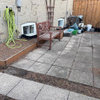Fireplace ashes
pjdsr
18 years ago
Related Stories

FIREPLACESUpdated Woodstoves Keep Home Fires Burning
Better technology means more efficiency than ever for modern woodstoves
Full Story
LIVING ROOMSHow to Convert Your Wood-Burning Fireplace
Learn about inserts and other options for switching your fireplace from wood to gas or electric
Full Story
GREAT HOME PROJECTSHow to Remodel Your Fireplace
Bring your fireplace design up to snuff with this makeover lowdown
Full Story
FIREPLACESThe Right Built-ins for Your Fireplace
Building the perfect storage around your fireplace starts with deciding what it's for. These 14 examples will get you started
Full Story
REMODELING GUIDESSurround Your Fireplace With Tile, Brick or Stone
Freshen up your fireplace with a crisp, colorful or dramatic new look
Full Story
FIREPLACESRibbons of Fire: 10 Artfully Minimalist Fireplaces
Long and lean and sleek to the core, these gas-burning fireplaces make a powerful contemporary statement
Full Story
FIREPLACESDesign Workshop: Is an Ethanol Fireplace Right for You?
Learn the pros, cons, types, cost and more details about ethanol, or gel-fueled, fireplaces
Full Story
FIREPLACESStoke Your Fireplace Design With Decorative Screens and Doors
Keep wayward sparks in while setting your fireplace ablaze with style, with a screen that suits your hearth and home
Full Story
LIVING ROOMSNew This Week: 3 Ways to Work Around a Living Room Fireplace
The size, location and materials of many fireplaces present decorating challenges. Here are a few solutions
Full Story
LIVING ROOMS8 Reasons to Nix Your Fireplace (Yes, for Real)
Dare you consider trading that 'coveted' design feature for something you'll actually use? This logic can help
Full Story






ericwi
Kimmsr
Related Professionals
Windham Landscape Architects & Landscape Designers · Surprise Landscape Contractors · Wilmington Landscape Contractors · Amesbury Landscape Contractors · Bridgeport Landscape Contractors · Darien Landscape Contractors · New Berlin Landscape Contractors · Peachtree City Landscape Contractors · Petaluma Landscape Contractors · Selden Landscape Contractors · Whittier Landscape Contractors · Arlington Heights Decks, Patios & Outdoor Enclosures · Baker Decks, Patios & Outdoor Enclosures · Centennial Decks, Patios & Outdoor Enclosures · Lafayette Decks, Patios & Outdoor EnclosuresPudgy
pjdsrOriginal Author
wayne_5 zone 6a Central Indiana
Kimmsr
paquebot
Kimmsr
albert_135 39.17°N 119.76°W 4695ft.
dchall_san_antonio
greentitan
andreik
pablo_nh
rootdoctor
pablo_nh
pjdsrOriginal Author
Billl
pablo_nh
saros
Kimmsr
pablo_nh
led_zep_rules
tom_in_nh
led_zep_rules
kleiner_centurylink_net